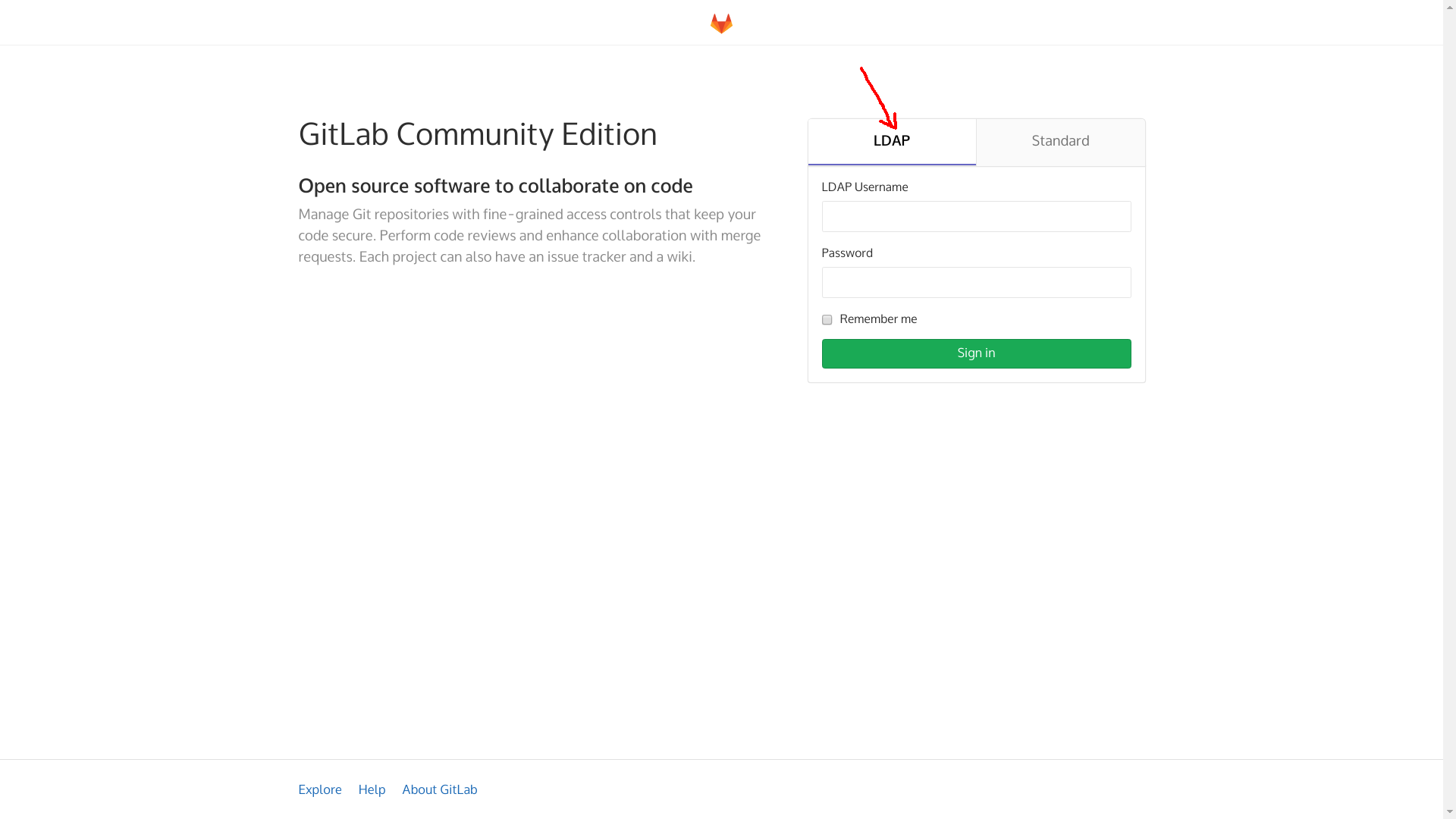GitLab to NAS

If you have a working NAS with a docker , installing Gitlab does not present any particular difficulties.
This article is just a good example in the NAS series. And it shows how easy it is to manipulate services on an already finished platform, even if it was built independently, without a development team specially tailored by the OS and application stores.
Why gitlab?
There are several systems for managing Git repositories.
- Bitbucket is a paid and closed system, although it is popular in the corporate sector. Integration with other Atlassian products that I do not use is assumed. Implemented in Java. Not a particularly suitable solution, especially considering the policy that you have to pay everything, even for plugins (although there are free ones).
- Gogs is a system similar to Gitlab. Implemented on Go. When I last looked at its capabilities, there was no possibility of reviewing the code. And in general, it lags behind in functionality from Gitlab, since The system is much newer:
- Lightweight.
- The interface is similar to Github.
- User management.
- Bug Tracker.
- Wiki.
- No review code.
- Git hook support.
- HTTPS / SSH access.
- Implemented on Go.
- There is a fork Gitea .
- There is an LDAP plugin.
- Gitea - fork Gogs. It has what is missing in the Gogs:
- Code review.
- Storage for large files.
- Tags
- Modified search.
- The progress of tasks with checkboxes.
- LDAP is also supported.
- Kallithea - fork RhodeCode.
- Very advanced user and group management.
- Synchronization with remote repositories.
- Bug Tracker.
- Wiki.
- There is a review code.
- Git hook support.
- HTTPS / SSH access.
- Implemented in Python.
- Integrates with LDAP.
- There is a Docker image.
- Phacility is a system from Facebook. The functionality is wide, there is not only a review, but even a system for managing tasks and projects. I did not consider it in detail.
- Gerrit - designed primarily for discussion and review of the code, with some functionality for managing repositories.
- Sr.ht - recommended in the comments . Apparently, the functionality is quite wide. But the system is still under active development.
I worked with Gitlab before, and it also has built-in CI functionality, which will come in handy in the future. The system is mature, there is a lot of documentation for it, and over the years Gitlab has been developing it has acquired many possibilities. Because I chose him.
General settings
I use the Gitlab image from sameersbn .
In docker-compose.yml (the file is also listed at the end of the article), the following variables need to be changed:
DB_PASSis the password for the Gitlab database. Must match the password in thepostgresqlcontainer.GITLAB_SECRETS_DB_KEY_BASE,GITLAB_SECRETS_SECRET_KEY_BASE,GITLAB_SECRETS_OTP_KEY_BASE- base values for key generation.GITLAB_ROOT_EMAIL- e-mail administrator.GITLAB_ROOT_PASSWORDis the default administrator password, which can later be changed from the Web interface.GITLAB_EMAIL,GITLAB_EMAIL_REPLY_TO,GITLAB_INCOMING_EMAIL_ADDRESS- addresses for email alerts.SMTP_HOST,SMTP_PORT,SMTP_USER,SMTP_PASS- SMTP settings for email alerts.IMAP_HOST,IMAP_PORT,IMAP_USER,IMAP_PASS- Gitlab can not only send mail, but also pick up via IMAP. He can make inquiries by e-mail.
LDAP setup
In order for NAS users to log in to Gitlab, it needs to provide an LDAP server as an authorization provider.
Note that when LDAP is configured, there will be two tabs on logging into Gitlab: LDAP and Standard.
The administrator will be able to log in only on the Standard tab, because he is registered locally, and users only on the LDAP tab.
Local administrator registration is useful in case the connection to the LDAP server is lost.
This is easily done by setting variables in the docker-compose configuration file:
LDAP_ENABLED=true- enable LDAP authorization.LDAP_HOST=172.21.0.1- address of the LDAP server.LDAP_PORT=389- port.LDAP_METHOD=plain- access method without encryption, because LDAP server within the host network. It is also possible to use StartTLS.LDAP_UID=uid- user UID field. In the case of OpenLDAP, in the configuration that was configured, this is theuid.LDAP_BIND_DN=cn=admin,dc=nas,dc=nas- the user and domain under which Gitlab is authorized on the LDAP server.LDAP_PASS=<LDAP_PASSWORD>is the password for the LDAP user under which Gitlab is authorized on the LDAP server.LDAP_BLOCK_AUTO_CREATED_USERS=false- an LDAP user will appear in Gitlab after his first login. If it is set totrue, it will be blocked. The administrator will be able to unblock it.LDAP_BASE=ou=users,dc=nas,dc=nasis the base address where user accounts are located.LDAP_USER_FILTER=memberOf=cn=users_code,ou=groups,dc=nas,dc=nas- filter. This indicates that I want to receive only members of theusers_codegroup.LDAP_ALLOW_USERNAME_OR_EMAIL_LOGIN=true- allow the user to log in not only by UID, but also by e-mail.
Note the LDAP_USER_FILTER parameter. In the previous article , user groups in LDAP were entered, and this option only allows users in the users_code group to users_code .
Gitlab ci
Configuring CI is described in detail in the Gitlab articles and documentation . It makes no sense to repeat.
In short, all that needs to be done:
- Go to the build agents page: https://git.NAS.cloudns.cc/admin/runners and copy:
- Address ( https://git.NAS.cloudns.cc/ ).
- Token.
- Register an agent. He will ask for the address and token during the registration process.
Registration is done by the following command:
docker-compose exec gitlab-runner /entrypoint register About what agents are in Gitlab, it is possible to read the documentation .
I did not include the Docker Registry, because I do not need it. For what it is and why you need it, read on the Gitlab website .
Below is a spoiler configuration file for Gitlab, which is also available in the repository .
# https://github.com/sameersbn/docker-gitlab version: '2' networks: gitlab: docker0: external: name: docker0 services: redis: restart: always image: sameersbn/redis:latest command: - --loglevel warning networks: - gitlab volumes: - /tank0/apps/gitlab/redis:/var/lib/redis:Z postgresql: restart: always image: sameersbn/postgresql:9.6-2 volumes: - /tank0/apps/gitlab/postgresql:/var/lib/postgresql:Z networks: - gitlab environment: - DB_USER=gitlab - DB_PASS=<DB_PASSWORD> - DB_NAME=gitlabhq_production - DB_EXTENSION=pg_trgm # plantuml: # restart: always # image: plantuml/plantuml-server # image: plantuml/plantuml-server:jetty # ports: # - "127.0.0.1:9542:8080" # ports: # - "plantuml:8080:8080" # expose: # - 8080 # networks: # - gitlab gitlab: restart: always image: sameersbn/gitlab:10.6.3 depends_on: - redis - postgresql ports: - "11022:22" expose: - 443 - 80 - 22 volumes: - /tank0/apps/repos:/home/git/data/repositories:Z - /tank0/apps/repos/system/backup:/home/git/data/backups:Z - /tank0/apps/repos/system/builds:/home/git/data/builds:Z - /tank0/apps/repos/system/lfs-objects:/home/git/data/shared/lfs-objects:Z - /tank0/apps/repos/system/public:/uploads/-/system:Z - /tank0/apps/gitlab/logs:/var/log/gitlab - /tank0/apps/gitlab/gitlab:/home/git/data:Z networks: - gitlab - docker0 environment: - "VIRTUAL_HOST=git.*,gitlab.*" - VIRTUAL_PORT=443 - VIRTUAL_PROTO=https - CERT_NAME=NAS.cloudns.cc - DEBUG=false # Default: 1 - NGINX_WORKERS=2 # Default: 3 - UNICORN_WORKERS=3 # Default: 25 - SIDEKIQ_CONCURRENCY=10 - DB_ADAPTER=postgresql - DB_HOST=postgresql - DB_PORT=5432 - DB_USER=gitlab - DB_PASS=<DB_PASS> - DB_NAME=gitlabhq_production - REDIS_HOST=redis - REDIS_PORT=6379 - TZ=Europe/Moscow - GITLAB_TIMEZONE=Moscow - GITLAB_HTTPS=true - SSL_SELF_SIGNED=true #- SSL_VERIFY_CLIENT=true - NGINX_HSTS_MAXAGE=2592000 - GITLAB_HOST=git.NAS.cloudns.cc #- GITLAB_PORT=11443 - GITLAB_SSH_PORT=11022 - GITLAB_RELATIVE_URL_ROOT= - GITLAB_SECRETS_DB_KEY_BASE=<DB_KEY_BASE> - GITLAB_SECRETS_SECRET_KEY_BASE=<SC_KEY_BASE> - GITLAB_SECRETS_OTP_KEY_BASE=<OTP_KEY_BASE> - GITLAB_SIGNUP_ENABLED=false # Defaults to 5iveL!fe. - GITLAB_ROOT_PASSWORD= - GITLAB_ROOT_EMAIL=root@gmail.com - GITLAB_NOTIFY_ON_BROKEN_BUILDS=true - GITLAB_NOTIFY_PUSHER=false - GITLAB_EMAIL=GITLAB@yandex.ru - GITLAB_EMAIL_REPLY_TO=noreply@yandex.ru - GITLAB_INCOMING_EMAIL_ADDRESS=GITLAB@yandex.ru - GITLAB_BACKUP_SCHEDULE=daily - GITLAB_BACKUP_TIME=01:00 - GITLAB_MATTERMOST_ENABLED=true - GITLAB_MATTERMOST_URL="" - SMTP_ENABLED=true - SMTP_DOMAIN=www.example.com - SMTP_HOST=smtp.yandex.ru - SMTP_PORT=25 - SMTP_USER=GITLAB@yandex.ru - SMTP_PASS=<SMTP_PASSWORD> - SMTP_STARTTLS=true - SMTP_AUTHENTICATION=login - IMAP_ENABLED=true - IMAP_HOST=imap.yandex.ru - IMAP_PORT=993 - IMAP_USER=GITLAB@yandex.ru - IMAP_PASS=<IMAP_PASSWORD> - IMAP_SSL=true - IMAP_STARTTLS=false - OAUTH_ENABLED=false - OAUTH_AUTO_SIGN_IN_WITH_PROVIDER= - OAUTH_ALLOW_SSO= - OAUTH_BLOCK_AUTO_CREATED_USERS=true - OAUTH_AUTO_LINK_LDAP_USER=false - OAUTH_AUTO_LINK_SAML_USER=false - OAUTH_EXTERNAL_PROVIDERS= - OAUTH_CAS3_LABEL=cas3 - OAUTH_CAS3_SERVER= - OAUTH_CAS3_DISABLE_SSL_VERIFICATION=false - OAUTH_CAS3_LOGIN_URL=/cas/login - OAUTH_CAS3_VALIDATE_URL=/cas/p3/serviceValidate - OAUTH_CAS3_LOGOUT_URL=/cas/logout - OAUTH_GOOGLE_API_KEY= - OAUTH_GOOGLE_APP_SECRET= - OAUTH_GOOGLE_RESTRICT_DOMAIN= - OAUTH_FACEBOOK_API_KEY= - OAUTH_FACEBOOK_APP_SECRET= - OAUTH_TWITTER_API_KEY= - OAUTH_TWITTER_APP_SECRET= - OAUTH_GITHUB_API_KEY= - OAUTH_GITHUB_APP_SECRET= - OAUTH_GITHUB_URL= - OAUTH_GITHUB_VERIFY_SSL= - OAUTH_GITLAB_API_KEY= - OAUTH_GITLAB_APP_SECRET= - OAUTH_BITBUCKET_API_KEY= - OAUTH_BITBUCKET_APP_SECRET= - OAUTH_SAML_ASSERTION_CONSUMER_SERVICE_URL= - OAUTH_SAML_IDP_CERT_FINGERPRINT= - OAUTH_SAML_IDP_SSO_TARGET_URL= - OAUTH_SAML_ISSUER= - OAUTH_SAML_LABEL="Our SAML Provider" - OAUTH_SAML_NAME_IDENTIFIER_FORMAT=urn:oasis:names:tc:SAML:2.0:nameid-format:transient - OAUTH_SAML_GROUPS_ATTRIBUTE= - OAUTH_SAML_EXTERNAL_GROUPS= - OAUTH_SAML_ATTRIBUTE_STATEMENTS_EMAIL= - OAUTH_SAML_ATTRIBUTE_STATEMENTS_NAME= - OAUTH_SAML_ATTRIBUTE_STATEMENTS_FIRST_NAME= - OAUTH_SAML_ATTRIBUTE_STATEMENTS_LAST_NAME= - OAUTH_CROWD_SERVER_URL= - OAUTH_CROWD_APP_NAME= - OAUTH_CROWD_APP_PASSWORD= - OAUTH_AUTH0_CLIENT_ID= - OAUTH_AUTH0_CLIENT_SECRET= - OAUTH_AUTH0_DOMAIN= - OAUTH_AZURE_API_KEY= - OAUTH_AZURE_API_SECRET= - OAUTH_AZURE_TENANT_ID= - LDAP_ENABLED=true #- LDAP_LABEL=nas - LDAP_HOST=172.21.0.1 - LDAP_PORT=389 #- LDAP_METHOD=start_tls - LDAP_METHOD=plain - LDAP_UID=uid - LDAP_BIND_DN=cn=admin,dc=nas,dc=nas - LDAP_PASS=<LDAP_PASSWORD> #- LDAP_CA_FILE= # Default: false. #- LDAP_BLOCK_AUTO_CREATED_USERS=true - LDAP_BASE=ou=users,dc=nas,dc=nas - LDAP_ACTIVE_DIRECTORY=false #- LDAP_USER_FILTER=(givenName=) - LDAP_USER_FILTER=memberOf=cn=users_code,ou=groups,dc=nas,dc=nas - LDAP_ALLOW_USERNAME_OR_EMAIL_LOGIN=true gitlab-runner: container_name: gitlab-runner image: gitlab/gitlab-runner:latest networks: - gitlab volumes: - /tank0/apps/gitlab/gitlab-runner/data:/home/gitlab_ci_multi_runner/data - /tank0/apps/gitlab/gitlab-runner/config:/etc/gitlab-runner environment: - CI_SERVER_URL=https://gitlab.NAS.cloudns.cc restart: always # registry: # container_name: docker-registry # restart: always # image: registry:2.4.1 # volumes: # - /srv/gitlab/shared/registry:/registry # - /srv/certs:/certs # environment: # - REGISTRY_LOG_LEVEL=info # - REGISTRY_STORAGE_FILESYSTEM_ROOTDIRECTORY=/registry # - REGISTRY_AUTH_TOKEN_REALM=http://git.labs.lc:10080/jwt/auth # - REGISTRY_AUTH_TOKEN_SERVICE=container_registry # - REGISTRY_AUTH_TOKEN_ISSUER=gitlab-issuer # - REGISTRY_AUTH_TOKEN_ROOTCERTBUNDLE=/certs/registry-auth.crt # - REGISTRY_STORAGE_DELETE_ENABLED=true # - REGISTRY_HTTP_TLS_CERTIFICATE=/certs/registry.crt # - REGISTRY_HTTP_TLS_KEY=/certs/registry.key # ports: # - "0.0.0.0:5000:5000" # networks: # mynet: # aliases: # - registry.git.labs.lc # ')
Source: https://habr.com/ru/post/418883/
All Articles
